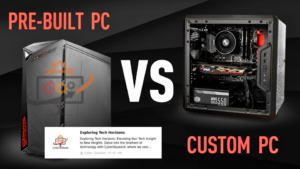Pros and Cons of Prebuilt and Custom PC Solutions
In the ever-evolving world of technology, one of the most pivotal decisions for consumers and enthusiasts alike is whether to opt for a prebuilt system or to embark on the journey of crafting a custom PC. Both avenues offer distinct advantages and disadvantages, catering to diverse needs and preferences. In this comprehensive exploration, we’ll delve into the intricacies of prebuilt and custom PC solutions, dissecting their pros and cons to help you make an informed decision tailored to your requirements.

Prebuilt PC Solutions:
Pros:
- Convenience and Accessibility: Perhaps the most compelling advantage of prebuilt PCs is their convenience. These systems arrive fully assembled and ready to use, sparing users the hassle of selecting individual components and assembling them. For individuals with limited technical knowledge or time constraints, this turnkey solution is immensely appealing.
- Manufacturer Support and Warranty: Opting for a prebuilt PC often comes bundled with manufacturer support and warranty services. This means that in the event of hardware malfunctions or technical issues, users can rely on the expertise of the manufacturer’s support team to troubleshoot and resolve problems. Additionally, warranties offer peace of mind, assuring users that they are covered for a specified period, minimizing financial risks.
- Cost-Effectiveness: Surprisingly, prebuilt PCs can sometimes offer cost savings compared to their custom-built counterparts. Manufacturers often benefit from economies of scale, allowing them to procure components at discounted rates. Consequently, they can pass on these savings to consumers, making prebuilt systems an attractive option for budget-conscious buyers.
- Quality Assurance: Reputable PC manufacturers adhere to rigorous quality control standards, ensuring that components are thoroughly tested before assembly. This meticulous scrutiny minimizes the likelihood of encountering hardware compatibility issues or defects upon receiving the PC, providing users with a reliable and hassle-free computing experience.
Cons:
- Limited Customization: The primary drawback of prebuilt PCs is their limited customization options. While manufacturers typically offer a range of configurations to cater to diverse needs, users may find themselves constrained by predetermined hardware combinations. This lack of flexibility can be frustrating for individuals seeking specific components or performance metrics tailored to their preferences.
- Upgradability Constraints: Prebuilt PCs may pose challenges when it comes to upgradability. Due to proprietary designs and form factors, certain components such as motherboards and power supplies may be difficult to replace or upgrade. Consequently, users may find themselves outgrowing their prebuilt systems sooner than anticipated, necessitating a complete overhaul or substantial investment in new hardware.
- Potential for Bloatware: Another common grievance associated with prebuilt PCs is the presence of bloatware – preinstalled software that serves little to no purpose and may degrade system performance. While manufacturers often include bundled applications as part of their software packages, users may find themselves spending time uninstalling unnecessary programs to streamline their computing experience.
- Perceived Lack of Quality: Despite the stringent quality control measures implemented by manufacturers, some users perceive prebuilt PCs as inferior to their custom-built counterparts in terms of build quality and component selection. This perception stems from the notion that prebuilt systems prioritize cost efficiency over premium components, potentially compromising on performance or longevity.
Custom PC Solutions:
Pros:
- Unparalleled Customization: One of the most significant advantages of custom PC solutions is the unparalleled level of customization they offer. From selecting individual components such as processors, graphics cards, and storage drives to choosing aesthetic elements like case designs and RGB lighting, users have complete control over every aspect of their system, ensuring it aligns perfectly with their preferences and requirements.
- Optimized Performance: By handpicking each component based on performance benchmarks, compatibility, and budget considerations, users can assemble a custom PC optimized for their intended use case. Whether it’s gaming, content creation, or productivity tasks, custom-built systems can be tailored to deliver exceptional performance and efficiency, surpassing the capabilities of off-the-shelf alternatives.
- Enhanced Upgradability: Unlike prebuilt PCs, custom-built systems offer superior upgradability, thanks to standardized components and modular designs. Users can easily swap out outdated hardware, incrementally upgrading their systems to keep pace with technological advancements without the need for a complete overhaul. This scalability ensures that custom PCs remain relevant and adaptable over time, prolonging their lifespan and maximizing return on investment.
- Sense of Satisfaction and Ownership: Building a custom PC is a deeply rewarding experience that fosters a sense of accomplishment and ownership. From researching components and assembling them piece by piece to powering on the system for the first time, every step of the process is imbued with excitement and fulfillment. Custom PC builders take pride in their creations, knowing that they’ve crafted a bespoke system tailored to their exact specifications.
Cons:
- Time and Effort: Building a custom PC requires a significant investment of time and effort. From researching compatible components to meticulously assembling them, the process can be daunting, especially for first-time builders. Additionally, troubleshooting hardware issues or compatibility conflicts can prolong the build process, testing the patience and perseverance of even the most seasoned enthusiasts.
- Technical Expertise Required: Unlike prebuilt PCs, which require minimal technical knowledge, custom PC assembly demands a certain level of proficiency in hardware configuration and troubleshooting. Novice builders may find themselves overwhelmed by the intricacies of cable management, BIOS settings, and driver installations, necessitating extensive research or guidance from experienced builders.
- No Manufacturer Support: Since custom-built PCs are assembled from individual components sourced from various manufacturers, they typically lack the comprehensive support and warranty coverage offered by prebuilt systems. In the event of hardware failures or compatibility issues, users may need to rely on individual component warranties or seek assistance from online communities and forums, potentially leading to longer resolution times and added complexity.
- Cost Variability: While custom PC solutions offer the flexibility to accommodate a wide range of budgets, the total cost of ownership can vary significantly depending on the selected components. High-end hardware configurations boasting the latest technology and premium features can incur substantial expenses, potentially exceeding the price of prebuilt alternatives. Budget-conscious builders must strike a balance between performance aspirations and financial constraints to ensure a cost-effective build.
Conclusion:
In the perpetual debate between prebuilt and custom PC solutions, there is no one-size-fits-all answer. Each approach presents a unique set of advantages and disadvantages, catering to different priorities and preferences. For users prioritizing convenience, affordability, and warranty coverage, prebuilt PCs offer a compelling solution. Conversely, enthusiasts seeking unparalleled customization, performance optimization, and a sense of ownership gravitate towards custom-built systems.
Ultimately, the decision boils down to individual requirements, technical proficiency, and budget considerations. Whether you opt for the convenience of a prebuilt PC or embark on the exhilarating journey of building a custom rig, one thing is certain – the world of PC gaming and computing offers boundless opportunities for creativity, innovation, and personalization. So, choose wisely, and embark on your quest for the perfect PC solution tailored to your needs and aspirations.
